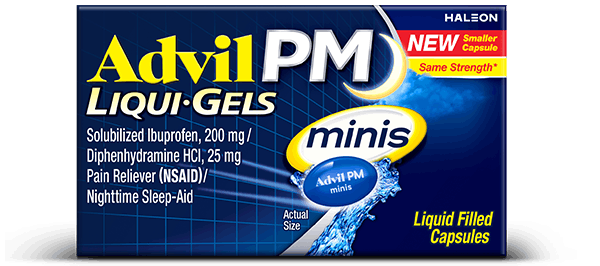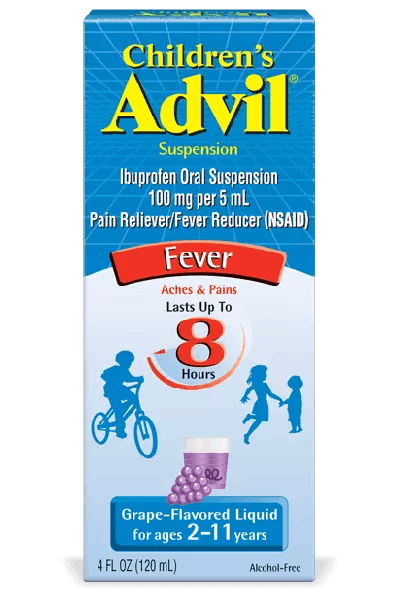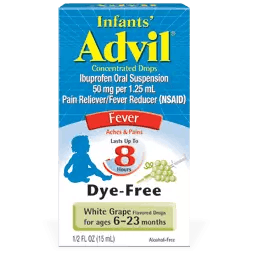Adding Research Publications to What We Know About Advil (Ibuprofen) and COVID-19 – September 23, 2020
Richard Petruschke, PharmD
Your safety, health, and trust in Advil (ibuprofen) is a huge responsibility that we take very seriously at GSK Consumer Healthcare.
We know you’ve had questions about taking ibuprofen to treat COVID-19 symptoms and may have wondered if ibuprofen can make COVID-19 or other respiratory illnesses worse. These questions may arise again as we head into this upcoming flu season and you reach for ibuprofen/Advil to treat flu-associated pain and fever when ill, just like you have in the past.
We’ve been constantly monitoring and evaluating research papers recently published in a broad range of scientific or academic journals around the world. Experts have weighed in, and these papers provide public health authorities and the medical community with an opportunity to review, assess and share knowledge about the safe use of ibuprofen. These experts are from the fields of infectious disease, pain management, respiratory disease, and public health, among other medical fields.
The scientific consensus is clear. Over-the-counter (OTC) ibuprofen/Advil remains safe to use as directed. The current scientific literature does not show that OTC ibuprofen/Advil makes COVID-19 health outcomes worse, and the world’s leading health authorities have confirmed there is no evidence to recommend that COVID-19 patients avoid OTC ibuprofen. The safety profile of ibuprofen/Advil remains unchanged and information can be reviewed on our site.
We are committed to an ongoing assessment of ibuprofen/Advil. While we have shared information as it became available through this site and other channels, we also want to provide a quick summary here of the research papers that have come to our attention.
Based on the totality of available information, GSK Consumer Healthcare, alongside many public health authorities around the world, is confident in the safe and effective use of OTC Advil when used as directed. Please speak directly with your doctor, pharmacist, or healthcare provider if you have questions about your individual treatment needs.
From everyone at GSK, stay well and be safe.
Recent Research Publications (March to September 2020)
- A study conducted in Denmark and published in PLOS Medicine in September 2020, concluded that there was no association between NSAID use up to 30 days before testing for COVID-19 and mortality within 30 days or adverse outcomes within 14 days, including hospitalization, ICU admission and ventilation, for COVID-19 patients, and that NSAIDs do not lead to more severe coronavirus disease [Adverse outcomes and mortality in users of non-steroidal anti-inflammatory drugs who tested positive for SARS-CoV-2: A Danish nationwide cohort study, Lund LC, Kristensen KB, Reilev M, et al. Adverse outcomes and mortality in users of non-steroidal anti-inflammatory drugs who tested positive for SARS-CoV-2: A Danish nationwide cohort study. PLoS Med. 2020;17(9):e1003308. Published 2020 Sep 8. doi:10.1371/journal.pmed.1003308]
- An article published in August 2020 by the London School of Hygiene and Tropical Medicine found no evidence of a harmful effect of NSAIDs on COVID-19 related deaths. Risks from COVID-19 do not need to influence decisions about therapeutic use of NSAIDs. [OpenSAFELY: Do adults prescribed Non-steroidal anti-inflammatory drugs have an increased risk of death from COVID-19?, Wong AYS, MacKenna B, Morton C, Schultze A, et al. OpenSAFELY: Do adults prescribed Non-steroidal anti-inflammatory drugs have an increased risk of death from COVID-19?. medRxiv; [Preprint]. August 14, 2020. doi:10.1101/2020.08.12.20171405]
- Researchers found no supporting evidence to discourage the use of ibuprofen in a July/August 2020 article published in the American Journal of Therapeutics, although authors raised a concern regarding the safety of ibuprofen use because of its potential role in increasing ACE-2 receptor levels within the Renin–Angiotensin–Aldosterone system. However, available data from limited studies show administration of recombinant ACE2 improves lung damage caused by respiratory viruses, suggesting ibuprofen use may be beneficial in COVID-19 disease. [COVID-19 and Avoiding Ibuprofen. How Good Is the Evidence?, Kutti Sridharan G, Kotagiri R, Chandiramani VH, et al. COVID-19 and Avoiding Ibuprofen. How Good Is the Evidence?. Am J Ther. 2020;27(4):e400-e402. doi:10.1097/MJT.0000000000001196]
- While a study published in Archives of Clinical Infectious Diseases in July 2020 found a “significant relationship” between the history of ibuprofen consumption and the symptom severity of COVID-19 and the mortality rate of COVID-19 patients in Iran, it is important to note the researchers did not study OTC ibuprofen and that the conclusion was primarily based on hospitalized patients with severe COVID-19 and underlying diseases such as hypertension, kidney disease and heart disease, who had been admitted to the ICU or died. The authors reported that the study was limited by its low sample size, and inaccuracy of the daily dose of NSAIDS. [The Association of Non-Steroidal Anti-Inflammatory Drugs with COVID-19 Severity and Mortality, Samimagham HR, Arabi M, Hooshyar D, KazemiJahromi M. The Association of Non-Steroidal Anti-Inflammatory Drugs with COVID-19 Severity and Mortality. Archives of Clinical Infectious Diseases. (In Press). Published 2020 Jul 13. doi: 10.5812/archcid.106847]
- A recent study, published in Headache in July 2020, concluded that there is no specific evidence at this time against the use of NSAIDs in patients with or without COVID‐19. Authors recommend a patient should be assessed for any other chronic diseases, underlying or pre-existing illnesses or conditions (i.e., co-morbid medical conditions) that may limit the use of NSAIDs and recommend a discussion of risks and benefits with all patients prior to prescribing NSAIDs. [COVID‐19 and Headache Medicine: A Narrative Review of Non‐Steroidal Anti‐Inflammatory Drug (NSAID) and Corticosteroid Use, Arca KN, Smith JH, Chiang CC, et al. COVID-19 and Headache Medicine: A Narrative Review of Non-Steroidal Anti-Inflammatory Drug (NSAID) and Corticosteroid Use [published online ahead of print, 2020 Jul 10]. Headache. 2020;10.1111/head.13903. doi:10.1111/head.13903]
- Authors of a study published in Nature (British Dental Journal) in July 2020 concluded that ibuprofen can be used appropriately for dental procedures, and that there is no guidance in the literature suggesting that changes should be made to analgesia regimes for dental patients with or without COVID symptoms nor to support avoiding ibuprofen in this group. [Safe Use of Paracetamol and High-Dose NSAID Analgesia in Dentistry During the COVID-19 Pandemic,Crighton AJ, McCann CT, Todd EJ, Brown AJ. Safe use of paracetamol and high-dose NSAID analgesia in dentistry during the COVID-19 pandemic. Br Dent J. 2020;229(1):15-18. doi:10.1038/s41415-020-1784-3]
- An article published in British Pharmacological Society in July 2020 noted that epidemiological studies have suggested potential benefits for NSAID use on reducing the risk of development of severe disease in COVID-19 patients while also raising warning for ibuprofen use in COVID-19 patients. [Non‐Steroidal Anti‐Inflammatory Drugs, Prostaglandins and COVID‐19, Robb CT, Goepp M, Rossi AG, Yao C. Non-steroidal anti-inflammatory drugs, prostaglandins, and COVID-19 [published online ahead of print, 2020 Jul 23]. Br J Pharmacol. 2020;10.1111/bph.15206. doi:10.1111/bph.15206]
- Researchers who published a paper focused on pneumonia in JAMA Network Open in July 2020 found that the currently available data, including the primary endpoints in their study, do not seem to support strong recommendations against using NSAIDs in patients with viral pneumonia. [Association of Nonsteroidal Anti-inflammatory Drug Use and Adverse Outcomes Among Patients Hospitalized with Influenza, Lund LC, Reilev M, Hallas J, et al. Association of Nonsteroidal Anti-inflammatory Drug Use and Adverse Outcomes Among Patients Hospitalized With Influenza. JAMA Netw Open. 2020;3(7):e2013880. Published 2020 Jul 1. doi:10.1001/jamanetworkopen.2020.13880]
- Authors of an observational study from South Korea, published by Clinical Infectious Disease in July 2020, suggested that the harms associated with NSAID use may outweigh their benefits for patients with COVID-19, and therefore should be used with caution. Researchers looked only at patients hospitalized with COVID-19 who were prescribed prescription-strength, not OTC NSAIDs in the 7 days before and including their inpatient hospitalization, and it is unclear if the prescribed NSAIDs were part of their COVID-19 treatment courses or for one or more underlying serious health conditions. [Association between NSAIDs use and adverse clinical outcomes among adults hospitalized with COVID-19 in South Korea: A nationwide study, Jeong HE, Lee H, Shin HJ, Choe YJ, Filion KB, Shin JY. Association between NSAIDs use and adverse clinical outcomes among adults hospitalized with COVID-19 in South Korea: A nationwide study [published online ahead of print, 2020 Jul 27]. Clin Infect Dis. 2020;ciaa1056. doi:10.1093/cid/ciaa1056]
- An article in Clinical Microbiology and Infection from June 2020 concluded that in the studied cohort of COVID-19 patients, ibuprofen use was not associated with worse clinical outcomes, compared with paracetamol (acetaminophen) or no treatment. [Ibuprofen Use and Clinical Outcomes in COVID-19 Patients, Rinott E, Kozer E, Shapira Y, Bar-Haim A, Youngster I. Ibuprofen use and clinical outcomes in COVID-19 patients [published online ahead of print, 2020 Jun 12]. Clin Microbiol Infect. 2020;26(9):1259.e5-1259.e7. doi:10.1016/j.cmi.2020.06.003]
- An early study in Vancouver, BC, Canada, concluded that the current epidemiologic evidence is not strong enough to infer a causal link of a harmful effect of ibuprofen in patients with COVID-19, and we need to be cautious when drawing conclusions from evidence that is derived from mechanistic or theoretical pharmacology, as they are not always corroborated with data from clinical trials. In this study from Chest in March 2020, the authors did advise that patients use acetaminophen monotherapy for fever reduction in a patient with COVID-19 and add ibuprofen if acetaminophen alone cannot reduce the fever. [Safety of Ibuprofen in Patients With COVID-19: Causal or Confounded?, Sodhi M, Etminan M. Safety of Ibuprofen in Patients With COVID-19: Causal or Confounded?. Chest. 2020;158(1):55-56. doi:10.1016/j.chest.2020.03.040]
By clicking the link(s) above, you will be taken to an external website that is independently operated and not managed by Haleon. Haleon assumes no responsibility for the content on the website. If you do not wish to leave this website, do not click on the links above.







